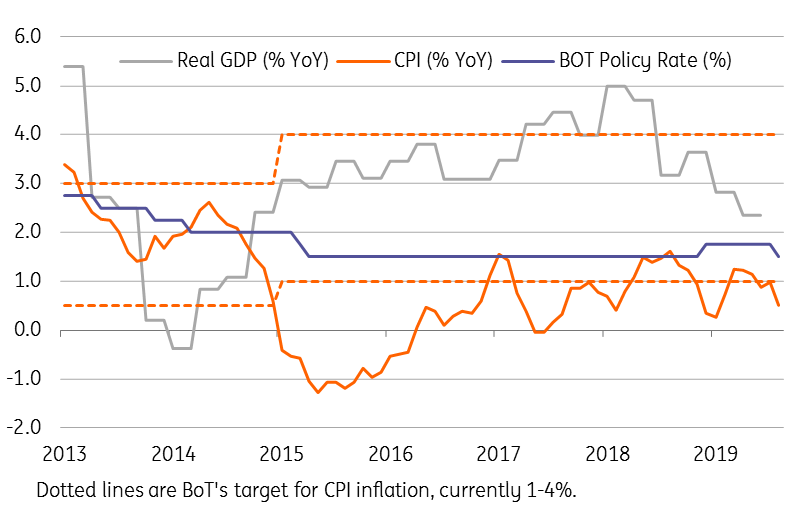Thailand’s low inflation trend gets traction
We are bringing forward our forecast for the next 25bp rate cut from the fourth quarter to the next BoT meeting on 25 September.
| 0.5% |
August CPI inflationYear-on-year |
| Lower than expected | |
Another downside inflation miss
Thailand's August consumer price index (CPI) rose by 0.5% year-on-year, a slowdown from the 1% inflation rate in the previous month. This was the third consecutive downside CPI miss against the consensus, which was centered on 0.7% inflation for August.
A sharp slowdown in the food component of CPI (2.6% vs. 3.5% in July) and a deeper decline in the transport component (-2.2% vs. -1.3%) were responsible for lower headline inflation. Core CPI inflation, which strips off food and fuel prices from the total, however, quickened to 0.5% from 0.4% in July.
Strong currency depresses inflation further
At 0.9% year-to-date, headline inflation in Thailand has slowed from 1.0% in the same period of 2018. The corresponding figures for core inflation are 0.5% and 0.7%. There was a significant spike in the food component this year, though that’s been offset by lower housing and transport components. And judging from the latest data the worst of the food inflation seems to be over.
However, besides housing and transport, a sustained Thai baht (THB) appreciation has also weighed on inflation, while global oil prices, often a key source of imported inflation, have also been missing this year. These trends look as if they are here to stay, thanks to Thailand’s strong external payments position and weak global demand weighing on the oil prices.
What's driving low inflation this year?

Has the BoT policy really hit its limits?
A headline in the Financial Times, “Thailand risks turning Japanese as monetary policy hits limits”, was eye-catching. Among the economy’s main woes, the underlying story pointed to low inflation, stalled growth for over a decade, and a rapidly aging population, while noting insufficient policy stimulus to turn the economy around and little policy leeway for the Bank of Thailand (BoT) with lowest policy rate among ASEAN-5.
The BoT started its easing path in August with a 25bp rate cut to 1.50%, which was merely a reversal of a 25bp rate hike in late 2018 rather than fresh stimulus. The previous low in BoT policy rates was 1.25% last reached during the 2009 global financial crisis. Given the current economic backdrop, we see that level reached as early as this month. We bring forward our forecast for next 25bp rate cut from the fourth quarter to the next BoT meeting on 25 September.
However, we believe the BoT could do more than that especially with inflation continuing to undershoot the 1-4% policy target, and with the recently announced $10 billion fiscal stimulus measures likely taking a while to pass down to the real economy. The BoT could also increase its efforts to rein in THB appreciation as other policy measures geared toward that aim have so far proved to be ineffective.
Growth, inflation, and Bank of Thailand policy rate

This publication has been prepared by ING solely for information purposes irrespective of a particular user's means, financial situation or investment objectives. The information does not constitute investment recommendation, and nor is it investment, legal or tax advice or an offer or solicitation to purchase or sell any financial instrument. Read more
Download
Download article
2 September 2019
Good Morning Asia - 3 September 2019 This bundle contains 2 Articles